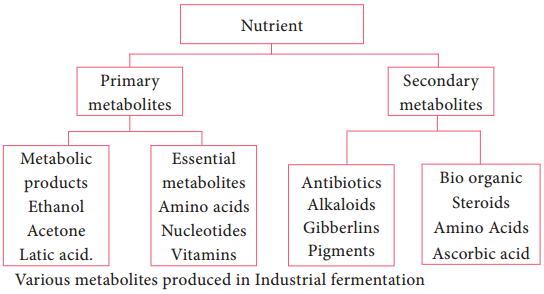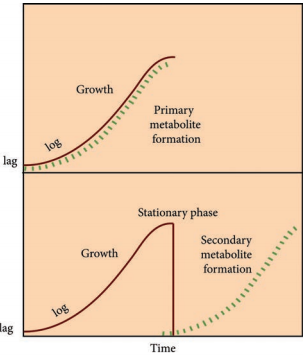Learninsta presents the core concepts of Microbiology with high-quality research papers and topical review articles.
Industrially Important Microorganisms and their Products of Microbiology
Microorganisms have the powerful capacity to produce numerous products, during their life cycle. Flowchart 6.1 shows the production of valuable metabolic products during the growth of microorganisms on a suitable medium under controlled environmental conditions. Microbial products are often classified as primary and secondary metabolites.

Primary metabolites consist of compounds related to the synthesis by microbial cells in the growth phase. Primary metabolites such as amino acids, vitamins, enzymes, organic acids and nitrogenous bases are produced by wide variety of microorganisms. These primary metabolites are essential for the growth of microorganisms and they are produced during Logarithmic phase.
Secondary metabolites do not play a role in development, growth and reproduction of microorganisms. They are produced at the end of growth phase near stationary phase. They usually accumulate during the period of nutrient limitation or waste product accumulation that follows the exponential phase. These compounds have no direct relationship to the synthesis of cell materials and normal growth.
They are the end products of the primary metabolism. Products such as steroids, alkaloids, antibiotics are secondary metabolites. Excessive production of the primary and secondary metabolites produced by the microorganisms are useful in the large scale in industrial production. Unlike primary metabolites, secondary metabolites are produced in small quantities and their extraction is difficult (Figure 6.2).

Some industrially important products are,
- microbial cells (living or dead), microbial biomass and components of microbial cells
- microbial metabolites
- intracellular or extracellular enzymes
- modified compounds that has been microbiologically transformed, and recombinant products through the DNA recombinant technology. (Table 6.1 shows some industrially important microorganisms)
Industrially important microorganisms

The industrial production of commercial products is carried out by fermentation process. The term fermentation is defined scientifically in a strict sense as a biological process that occurs in the absence of oxygen (anaerobic).
In industrial sense any process mediated by or involving microorganisms in which a product of economic value is obtained is called fermentation. The term Industrial fermentation also means large scale cultivation of microorganisms even though most of them are aerobic.
There are many microbiological processes that occur in the presence of air (aerobically) yielding incomplete oxidation products.
Examples:
- The formation of acetic acid (vinegar) from alcohol by vinegar bacteria
- Citric acid from sugar by certain molds such as Aspergillus niger. These microbial processes are often referred to as fermentations, although they do not decompose in the absence of air.